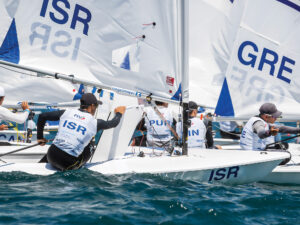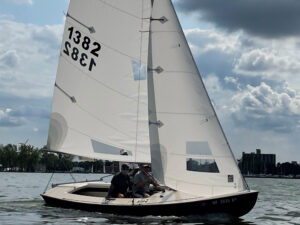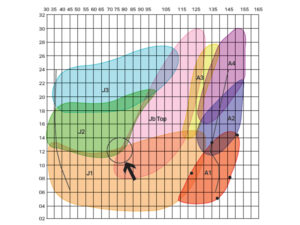
SWLogo
US SAILING announced that three new prescriptions will take effect on July 1. The prescriptions, which are shown in the box below, involve requests for redress and, to a lesser extent, protests. As with all US SAILING prescriptions, the new prescriptions apply only to races held within the United States.
I believe the first two of these prescriptions, the prescriptions to Rules 60 and 63.2, correct two problems involving requests for redress that have been with us for many years. Here’s an example that illustrates the problems, and how the new prescriptions help.
Suppose that, after several general recalls of a large fleet, the race committee hoists the black flag as the preparatory signal and then disqualifies 10 boats that it identifies as being over the line during the last minute (see Rule 30.3). These 10 boats return to shore while the rest of the fleet sails the race. After the race, all 10 skippers request redress, claiming they were over early only because the pin end of the starting line was moving. Under the current rules, the parties to the redress hearing will be those 10 boats. Suppose they present evidence that convinces the protest committee to grant them redress in the form of their average scores in all races in the series except the race in which they were over early.
If such a redress hearing is conducted under our current rules, those rules create two problems—one involving fairness and one involving procedure. In a protest hearing, both the protestor and the protestee have the right to be present and to present testimony and their opinions. However, under the current rules only the boat or boats requesting redress are present during the hearing. This compromises fairness because the overall positions of all the other boats in the fleet are affected by the redress decision, yet none of them are given the opportunity to testify regarding the facts, regarding whether the disqualification of the 10 boats was through “no fault” of their own (see Rule 62.1), or regarding which redress arrangement would be “as fair an arrangement as possible for all boats affected” (see Rule 64.2). In my opinion, it is not fair to conduct the hearing without at least some of the boats that started properly being present with the right to participate.
Within two hours of the time that a boat that was not over early hears of the decision to grant the over early boats their average scores, she may herself request redress on the grounds that the first redress decision was improper (see Rules 62.1(a) and 62.2). If, in the resulting second hearing, the protest committee reverses its redress decision, then the 10 over early, now disqualified boats, are entitled under those same rules to request a third hearing. This game of redress ping-pong can continue into the wee hours of the morning.
The new prescriptions to Rules 60 and 63.2 solve both problems. Under them, the protest committee, upon receipt of the request for redress from the 10 disqualified boats, will be required to make a “reasonable attempt” to notify all boats in the race of the nature of the redress request and of the time and place of the hearing. Then, “any boat may participate in the hearing provided she makes a written request before the hearing begins.” A boat that makes such a request will have all the same rights as the boats that made the original request. Thus, the fairness issue is solved, and the likelihood becomes high that the matter will be resolved with just one hearing.
Those writing sailing instructions will have to give some thought to how the protest committee will provide the notice required by the new prescription to Rule 63.2. The simplest means may be to state in the sailing instructions that posting the required information within 15 minutes of the expiration of protest time each day will be considered delivery of the required notice. In a long series extending over several weeks, the notice could be delivered by e-mail, and in a small event it could be delivered verbally to each boat. If, despite a “reasonable attempt” to provide notice, a boat is not notified, all is not lost. Such a boat still will have the right to request a second redress hearing under Rule 62.1(a).
The third new prescription has two parts. Under part (a), if a member of the protest committee saw an incident and, as result, either brought the incident to the attention of the committee or will give testimony about the incident during the hearing, then “when practicable” that person is required not to serve on the panel that conducts the hearing into the incident. This merely codifies a practice that many protest committees have been following for years. If it happens that all the members of the protest committee are watching a race and they all see an incident, then it will probably not be “practicable” to find an entirely new protest committee to replace them. Part (b) of the third new prescription will rarely apply. It requires, again “when practicable,” that if a request for redress is made under Rule 62.1(a) claiming that a protest committee decision was “improper,” the request must be heard by a new protest committee, one which contains no members of the original committee.
Such a request is highly unlikely to be made after either a protest hearing or a redress hearing. If Boats A and B were the parties to a protest hearing and one of them felt the protest committee’s decision was improper, that boat may request that the original hearing be reopened, but she may not request redress (see the exception at the end of Rule 62.1(a)). Therefore, part (b) of the third new prescription would only apply if a third boat, that was not a party to the original hearing, requested redress. In my many years of judging, I have never seen such a request made. If the original hearing was a redress hearing, then, under the new prescriptions to Rules 60 and 63.2, any boat interested in that hearing would probably have participated in it as a party. Just as in the case of a protest hearing, if a party is not happy with the decision of a redress hearing, then she must request a reopening and may not request redress based on an allegedly “improper” decision of the protest committee. There is no requirement, either in the rules or in the prescriptions, for a new protest committee when a hearing is reopened. In fact Rule 66 requires that whenever possible the committee that reopens a hearing be the same committee that conducted the original hearing.
The new prescriptions will not be listed in the US SAILING prescription to Rule 88.2. This means that the sailing instructions for any event may change any of the new prescriptions.
- ** New Prescription to Rule 60**
US SAILING prescribes that when redress has been requested or is to be considered, any boat may participate in the hearing provided she makes a written request before the hearing begins. When she does so, the protest committee shall act under rule 60.3(b) to consider redress for her at that hearing.
- New Prescription to Rule 63.2
US SAILING prescribes that when redress has been requested or is to be considered, the protest committee shall make a reasonable attempt to notify all boats of the time and place of the hearing and the nature of the request or the grounds for considering redress. Before holding the hearing, the committee shall allow reasonable time for boats to make written requests to participate.
- New Prescription to Rule 63.4
US SAILING prescribes that when practicable: (a) no person who brings an incident to the attention of the protest committee or who will give evidence at the hearing shall be a member of the protest committee; and (b) if a boat files a request for redress based on a protest committee decision, her request for redress shall be heard by a new committee that contains no members of the original committee.
E-mail for Dick Rose may be sent to rules@sailingworld.com









